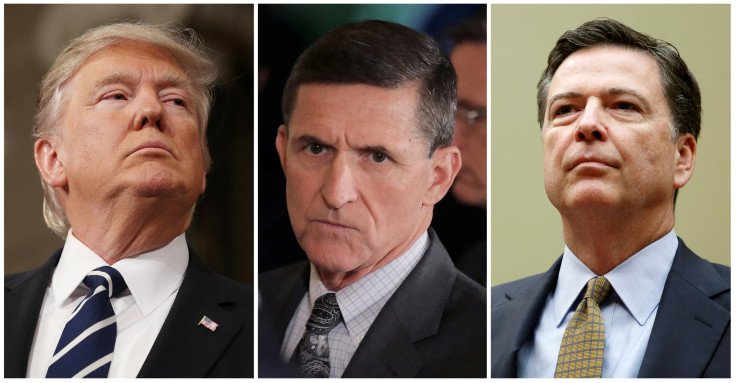Is Trump Guilty Of Obstructing Justice? Bill Clinton And Richard Nixon Also Part Of Similar Controversies

Hours after reports surfaced stating President Donald Trump disclosed highly classified information to Russia, the New York Times, in its report, Tuesday, cited a memo by former FBI Director James Comey. The memo underlined a conversation between Comey and Trump in February, where the president had asked the former director to shut down the federal investigation into former National Security Adviser Michael Flynn. Soon after the memo was released, the phrase "obstructing justice" became ubiquitous in major publications.
Shocker! John Dean says it's just like Nixon. Dining out on Watergate 43 yrs later.
— Laura Ingraham (@IngrahamAngle) May 17, 2017
This isn't the first time a president has been linked to obstructing justice. Former President Richard Nixon was also charged with the first three articles of impeachment for obstruction of justice in 1974 after he refused to release White House tape recordings containing important information regarding the Watergate scandal.
Read: Did Trump Influence Michael Flynn FBI Investigation?
In June 1972, several burglars had been caught for breaking into the Democratic National Committee headquarters in the Watergate building in Washington, D.C. The criminals were connected to Nixon's reelection campaign and were caught while attempting to wire trap phones and steal classified documents. Historians remained uncertain whether Nixon knew about the Watergate espionage operation from before, but he ensured to cover it up. He reportedly bribed the burglars, tried to stop the FBI from investigating the robbery, destroyed all evidence, and fired uncooperative staff members as well. In 1974, his role in Watergate conspiracy was out and he had to step down.
In 1998, President Bill Clinton was impeached on two charges — perjury and obstruction of justice. According to the impeachment proceedings, there were 11 possible grounds for Clinton's impeachment. Regarding Clinton's sexual relationship with Monica Lewinsky, a former White House intern, the proceedings stated: "President Clinton lied under oath in his civil deposition about his discussions with Ms. Lewinsky concerning her involvement in the Jones case."
And about Clinton's relationship with Paula Jones, a former Arkansas state employee, the proceedings stated: "During the Jones case, the President obstructed justice and had an understanding with Ms. Lewinsky to jointly conceal the truth about their relationship by concealing gifts subpoenaed by Ms. Jones's attorneys."
Obstruction of justice refers to a crime committed in order to intentionally impede official investigations. Some illegal ways to threaten the justice system include killing a witness or destroying evidence. There can be broader definitions of obstruction of justice such as Sections 1503, 1505 and 1512 of Title 18, which contains variants of language, making it a crime if someone corruptly “obstructs, influences or impedes any official proceeding," according to the New York Times.
Analysts are still debating whether Trump actually obstructed justice by asking Comey to drop investigations into Flynn.
"Obstruction of justice is not a black-and-white offense, so reasonable minds may well disagree about whether asking Comey to go easy on Flynn rises to the level of what federal law prohibits," said Steve Vladeck, CNN legal analyst and professor of law at the University of Texas School of Law.
He added: "But whether the President's conduct is or is not within the letter of the law is irrelevant; there's a really good reason why, for generations, presidents from across the ideological spectrum have respected the principle of not interfering in federal criminal investigations. That President Trump seems wholly indifferent to this principle, or the potentially devastating consequences of its demise, is the real scandal here."
Andrew McCarthy, a former federal prosecutor who writes for the National Review, said: "A prosecutor wouldn't make a decision on the basis of one hearsay line in a memo that has not been publicly available and that no one knows the context of."
© Copyright IBTimes 2024. All rights reserved.





















